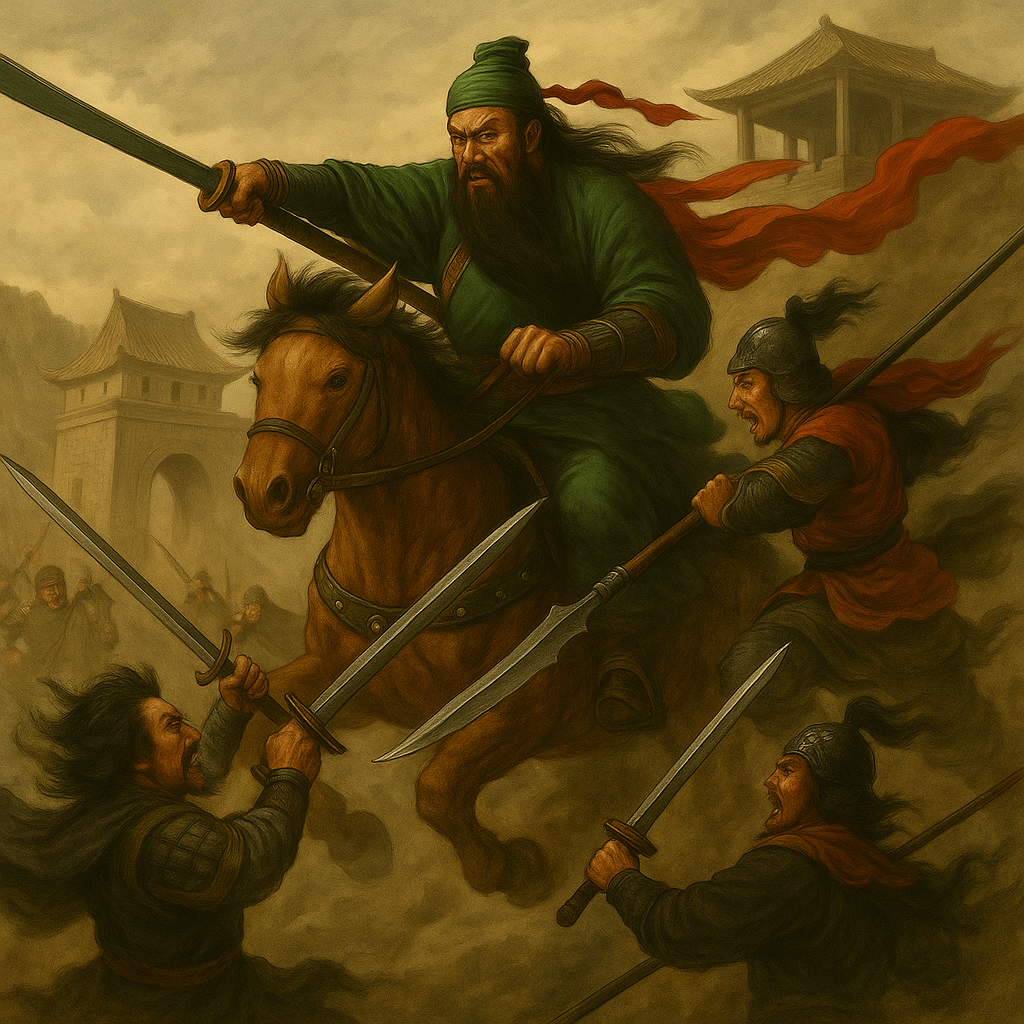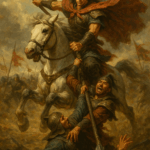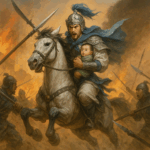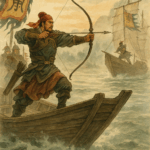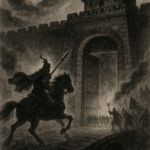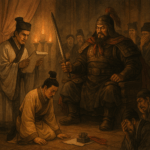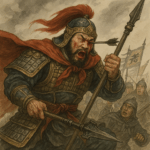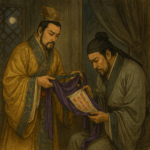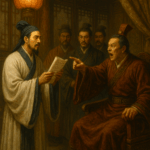That night, as Chen Gong prepared to slay Cao Cao in his bedchamber, his conscience turned: “I have followed him for the realm—’tis unjust to kill him now. Better I depart and seek my own path.” He sheathed his blade, mounted, and before dawn slipped away to Eastern Commandery. Waking to find Chen Gong gone, Cao Cao surmised, “He must doubt my loyalty and has abandoned me. I cannot linger—I must ride on.” Under cover of darkness he reached Chenliu and found his father. He recounted all that had befallen him and vowed to disperse his outlay to recruit loyal volunteers.
But his father counseled, “Our own means are scant; success lies in winning allies of substance. There is the filial and generous Wei Hong here—a man of great wealth and upright character. If he lends us his support, we may yet succeed.” Cao Cao at once laid a feast and entreated Wei Hong: “The Han throne lies vacant, the tyrant Dong Zhuo besieges what remains of imperial rule. I would uphold the dynasty, yet my strength is insufficient. You, sir, are a man of loyalty and justice—will you join my cause?” Moved, Wei Hong replied, “My heart has longed for such a venture; now that you, Cao Cao, dare stand, I offer all I possess.”
Elated, Cao Cao first made haste to issue a forged imperial edict, carried at speed to every commandery. Then, under the banner of “Loyalty and Righteousness,” white flags sprang up across the countryside. In mere days, volunteers poured in like summer rain.
Among the first was Yue Jin of Yangping Wei—courtesy name Wenqian—who presented himself to Cao Cao. Next came Li Dian of Shanyang Julu, courtesy name Mancheng. Both were retained as officers at his camp. Soon after arrived the fierce kinsmen Xiah Hou Dun and Xiah Hou Yuan of Pei Commandery—descendants of the venerable Xiah Hou Ying—each bringing a thousand sturdy fighters. They had mastered spear and cudgel from boyhood, and even in youth Xiah Hou Dun had slain a villain who insulted his teacher.
Before long, Cao Cao’s childhood allies, his brothers Cao Ren (Zixiao) and Cao Hong (Zilian), each led over a thousand men to his standard. Cao Cao rejoiced and drilled his makeshift host in the village, while Wei Hong poured forth his treasures on armor and banners. Supplies arrived in such abundance that no quarter was left wanting.
Word of the forged edict reached Yuan Shao in Bohai. He rallied his civil and military officers, mustered thirty thousand troops, and rode south to pledge himself to Cao Cao’s banner. Cao Cao’s proclamation declared:
“Dong Zhuo deceives Heaven and defies Earth, slaying emperors and ravaging the realm. His corruption pollutes the palace, his cruelty tramples the people. By secret edict of the Son of Heaven, we raise righteous arms to purge this evil and restore the Han. Let all patriots heed this call, rally to our cause, defend the dynasty, and relieve the suffering of the common folk.”
In every commandery the warlords responded:
- Yuan Shu, former General and Governor of Nanyang.
- Han Fu, Inspector of Jizhou.
- Kong Zhou, Inspector of Yuzhou.
- Liu Dai, Inspector of Yanzhou.
- Wang Kuang, Governor of Henei.
- Zhang Miao, Governor of Chenliu.
- Qiao Mao, Governor of Dongjun.
- Yuan Yi, Governor of Shanyang.
- Bao Xin, Prefect of Jibei.
- Kong Rong, Governor of Beihai.
- Zhang Chao, Governor of Guangling.
- Tao Qian, Inspector of Xuzhou.
- Ma Teng, Governor of Xiliang.
- Gongsun Zan, Governor of Beiping.
- Zhang Yang, Governor of Shangdang.
- Sun Jian, Marquis of Wucheng and Governor of Changsha.
- Yuan Shao himself, Marquis of Qixiang and Governor of Bohai.
Their combined forces—some thirty thousand strong, others ten to twenty thousand—marched on Luoyang.
Liu Bei Joins Gongsun Zan
Gongsun Zan, commanding fifteen thousand crack troops, passed through Pingyuan County in Dezhou. There, beneath a thicket of mulberry trees, he spied a yellow banner and several riders riding to meet him. Presenting himself was Liu Xuan De (Liu Bei). “Why grace us with your presence, honored brother?” asked Gongsun Zan. Liu Bei replied, “You once appointed me Prefect of Pingyuan. Now your host passes by—I come to render my service.”
Gongsun Zan turned to two stalwart figures at Liu Bei’s side. “And who are these?” “Guan Yu and Zhang Fei,” answered Liu Bei—“my sworn brothers who fell the Yellow Turban rebels by my side.”
Gongsun Zan sighed, “Such valor belies low rank. With Dong Zhuo’s tyranny, the warlords now unite to strike him down. Brother, forsake your petty office—come with us to destroy the traitor and restore the Han!”
Liu Bei bowed, “I am yours to command.” Zhang Fei spat, “Had you allowed me, I would have slain Dong Zhuo then and there.” Guan Yu assented, “Now that the die is cast, we follow your lead.”
So the Three Brothers and Gongsun Zan’s vanguard crossed paths with Cao Cao’s host. Camps stretched over two hundred li as they joined forces. Cao Cao slaughtered oxen and horses in a grand feast for the assembled lords to plan strategy.
Yuan Shao Made Leader of the Alliance
Wang Kuang of Henei spoke first: “To fight under a moral cause, we must first choose an Overlord to bind us by oath.” Cao Cao recommended Yuan Shu’s kinsman Yuan Shao—descended from four generations of ministers and graced by countless retainers. Reluctantly, Yuan Shao accepted.
The next day a three-tiered platform was erected, banners of five directions hoisted, and a white eloquence-pole and golden battle-axe placed as symbols of authority. Yuan Shao, clad in sword-belt and formal garb, ascended the platform, burned incense, and knelt thrice. The alliance oath proclaimed:
“The Han has fallen into dire plight; the bonds of sovereignty unravel. Dong Zhuo the traitor abuses his fleeting power, inflicting torment upon the people. In dread of the dynasty’s collapse, we unite righteous arms to attend our sovereign’s need. Let our league be inviolate in purpose. Should any break this oath, may heaven and earth themselves witness the doom that befalls his house.”
They sealed their vow in blood and tears. Yuan Shao then sat in his command tent, flanked by the lords in order of rank and age. Cao Cao raised wine to the assembly: “Now that our Master of Oaths stands confirmed, all answer to his command. Strength and weakness shall count no more—only fidelity to the realm.” Yuan Shao pledged, “Though unworthy, I will reward merit and punish treason, uphold discipline, and guard our pact.”
He appointed his brother Yuan Shu to oversee the provisions and called for a vanguard to strike the traitor’s stronghold at Sishui Pass.
Sun Jian’s Vanguard and the Fall of Hua Xiong
Sun Jian of Changsha leapt forward: “I volunteer to lead the advance.” Yuan Shao nodded, and Sun Jian charged south with his guards to Sishui Pass. Alarmed, the defenders sent for Dong Zhuo’s aid. At Luoyang the tyrant feasted daily; Li Ru brought him the urgent dispatch.
Summoning his generals, Dong Zhuo fretted, “These lords gather strength fast. Gongsun Zan’s force is vast, Yuan Shao leads them—if they unite with our enemies, we are undone. Better we strike at them first.” Li Ru advised, “Let Chancellor Dong march in person, purge the traitors swiftly.” Dong Zhuo assented and dispatched Li Jue and Guo Si with five hundred troops to surround Tutor Yuan Kui’s mansion—slaying his household without mercy and taking his head as a proclamation.
He then mustered two hundred thousand men for the campaign. He sent Li Jue and Guo Si with fifty thousand to hold Sishui Pass; himself, with deputies Li Ru, Lü Bu, Fan Chou, and Zhang Ji, he would garrison Hulao Pass fifty li east of Luoyang. On arrival, he placed Lü Bu in command of thirty thousand troops before the gate.
The Battle of Sishui Pass
At dawn, messengers warned Yuan Shao’s camp: “Dong Zhuo holds Hulao Pass!” Yuan Shao convened the lords. Cao Cao counseled, “Divide our host: half to oppose Dong Zhuo, half to relieve the pass.” So eight contingents—led by Wang Kuang, Qiao Mao, Bao Xin, Yuan Yi, Sun Rong, Zhang Yang, Tao Qian, and Gongsun Zan—marched to Hulao. Cao Cao brought the remainder to reinforce them.
First to reach the pass was Wang Kuang of Henei. He arrayed his troops beneath Sishui Gate when onward came Lü Bu: crested in three-pronged helm, clad in red-flowered brocade and ring-mail embossed with beast-faces, wielding his famed halberd, astride the legendary steed Red Hare. Wang Kuang charged a champion—General Fang Yue—who met Lü Bu’s blow and was unhorsed. Wang’s host broke and fled as Lü Bu’s cavalry surged through.
Relief arrived from Qiao Mao and Yuan Yi’s forces, driving Lü Bu back—yet losses were heavy. The allied hosts, shaken by Lü Bu’s prowess, fell back thirty li to bivouac. Each of the eight contingents suffered alike, until all gathered to confer.
The Three Heroes Confront Lü Bu
While they debated, Lü Bu issued a challenge. The lords rode forth as one, eight lines converging on his position atop a small hill. Gongsun Zan’s spearman Mu Shun of Shangdang led the charge and fell beneath Lü Bu’s halberd. Then Kong Rong’s captain Wu Anguo advanced, swinging a war-hammer—only to lose his arm to Lü Bu’s blade and flee in disgrace.
Reports of their fallen commanders emboldened none, and the lords hesitated. Cao Cao spoke, “This champion is peerless—let us summon the great trio of Liu Bei, Guan Yu, and Zhang Fei. If any can match him, it is they.”
At that moment, a stalwart figure stood forth in the rear of Gongsun Zan’s pavilion. Nine feet tall, with fierce “phoenix-eyes” and curling whiskers, face as red as a jujube, voice like a war-drum—it was Guan Yu of Xuzhou. Gongsun Zan introduced him: “This is Liu Bei’s sworn brother Guan Yu.”
Cao Cao interposed, “Though he is but a mounted archer, his bearing is no trifling matter. Let us try him, and should he fail, we may cut him down.” Yuan Shao objected, “He is only an archer—how can he hope to stand against Lü Bu?” Cao Cao smiled: “Appearances can deceive. If he cannot win, then we shall hold him to his word.”
Guan Yu asked for a cup of warm wine, then strode from the pavilion with his blade, mounted his steed, and advanced on Lü Bu. The lords watched in awe as drumbeats thundered and shouts shook the sky. When the din subsided, Guan Yu returned trailing the head of Hua Xiong—still warm in his hand. A later poem praised:
“He calmed the world with a single stroke,
At Sishui Gate the war-drums rolled.
Guan Yu paused mid-cup to display his courage—
The wine yet warm upon his lips.”
The assembled lords fell to weeping at so heroic a feat. Zhang Fei roared, “My brother has slain the chief villain—what delay stops us? Let us ride straight to Luoyang and seize Dong Zhuo!” Yuan Shu bristled, “You are a mere county magistrate—stand down!”
Cao Cao intervened, “Such trifling rank matters not when heaven-sent valor stands revealed.” Yuan Shao scowled but relented. Gongsun Zan took Liu Bei, Guan Yu, and Zhang Fei back to their tents, and the council broke for the night. Cao Cao privately sent them wine and provisions.
Dong Zhuo Strikes at Tutor Yuan Kui
At Luoyang, Hua Xiong’s shattered detachment reported back. Alarmed, Dong Zhuo and his generals—Li Ru, Lü Bu among them—feared the alliance’s momentum. Li Ru urged seizing the alliance’s heart by striking at Tutor Yuan Kui: “If we arrest him, the coalition fractures.” Dong Zhuo agreed, sent Li Cui and Guo Si with five hundred men to massacre Yuan Kui’s household, and borne his head to Hulao Pass.
He then marched east with two hundred thousand troops in two columns: Li Jue and Guo Si held Sishui Pass, while Dong Zhuo himself—backed by Li Ru, Lü Bu, Fan Chou, and Zhang Ji—took up position at Hulao, awaiting the allied advance.
And so at Hulao, under the banner of “Heaven and Earth Aligned,” the forces of the Three Heroes readied to renew the fight to overthrow tyranny. The fate of a dynasty hung upon the clash yet to come.
